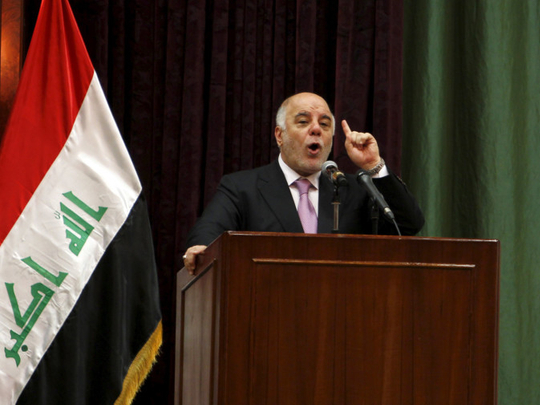
Over the past few weeks, Iraq has been witnessing a growing protest movement in the largely Shiite-populated parts of the country. It all started in the southern city of Basra, when youth-led sit-ins were held to protest poor local services and rampant corruption precipitated the intervention of Iraqi security forces, leading to the death of a 19-year-old man. The protest movement spread throughout the southern part of the country afterwards. It did not reach Baghdad until late July, when railway workers protested delayed salaries, leading to the closure of several major roads.
In an attempt to please the protesters and meet their demands, Prime Minster Haidar Al Abadi initiated a far-reaching reform agenda through which he sacked all three vice-presidents as well as his deputies. All had previously served to fill sectarian quotas. The most prominent amongst those who lost their positions was vice-president and former prime minister Nouri Al Maliki. An independent judicial commission to investigate major corruption charges has been formed, with Al Maliki being one of the likely defendants.
In fact, sharp divisions have, in recent years, emerged within the Shiite political bloc. It surfaced clearly during the last two legislative elections when Shiite political parties failed to form a unified electoral bloc to contest the elections. Many Shiite political groups also opposed Al Maliki’s attempt to stay in power for another term in 2010. In 2014, several Shiite political parties, backed by Grand Ayatollah Ali Sistani, Iraq’s most influential Shiite cleric, succeeded in co-ordinating with Sunni and Kurdish fellows in deposing Al Maliki and replacing him with Al Abadi.
The aforementioned division, in fact, represents fierce struggle over the representation of the Shiite community in Iraq between two political currents and worldviews. One of these currents pays allegiance to Iran, while the other sees itself as an Iraq Arab first and foremost. Politically, the first group centres around Al Maliki. The emergence of Daesh (the self-proclaimed Islamic State of Iraq and the Levant) helped the pro-Iran Shiite parties to join forces and establish a formidable militia called the ”Popular Mobilisation”. This militia was founded by Hadi Al Amiri, leader of the pro-Iran Badr Organisation. The other political Shiite current centres around Al Abadi. It is supported by “The Supreme Iraqi Islamic Council” and the Sadri movement and backed by Shiite clerical authorities in Najaf.
In the wake of the fall of Mosul to Daesh, the Al Maliki group attempted to appropriate the formation of the Popular Mobilisation Militia, presenting itself as the leading Shiite force in the confrontation with Daesh. At a time when Daesh seemed to pose genuine threat to the Shiite community, Al Abadi’s camp found itself vying with a demagogic opponent for the right to represent Shiite political aspirations.
Hence, Once the protest movement broke out in Basra, Al Maliki tried to capitalise on it, in what appeared to be an attempt to overthrow Al Abadi. Pro-Al Maliki media outlets urged sympathisers to go out into the streets and protest against the government. It was only then that Al Abadi decided to take the initiative and turn the table against Al Maliki. The green light came in the form of a sermon delivered on August 7 by a representative of Al Sistani, who called on Al Abadi to confront corruption “with an iron fist”.
Before his decisions were made public on August 9, Al Abadi had discussed his reform measures with leaders of the Supreme Council, the Sadri movement and some Dawa Party leaders close to him. Ultimately, it was ratified by the Council of Ministers on the same day, passing onwards to the House of Representatives as a bill and it was ratified by the parliament on August 11.
Al Abadi’s move came at a crucial moment, as the international community and the anti-Daesh international coalition were becoming increasingly impatient with what was described as “Al Abadi’s weakness” and his inability — or unwillingness — to confront his Shiite opponents, preferring instead to please all sides. As a result of this foot-dragging, Daesh’s control of large swathes of territories it seized during the summer of 2014 continued unchallenged.
Al Abadi’s bold measures changed the pessimistic mood about the inability of Iraqis to overcome their sectarian divisions and move towards building a national consensus in which all Iraqis contribute to the building of their homeland. Since Al Abadi has finally decided to implement his long-awaited reform agenda, he must proceed with it to the very end with all the measures needed to promote a new vision of all-inclusive national good governance.
Dr Marwan Kabalan is a Syrian academic and writer.










